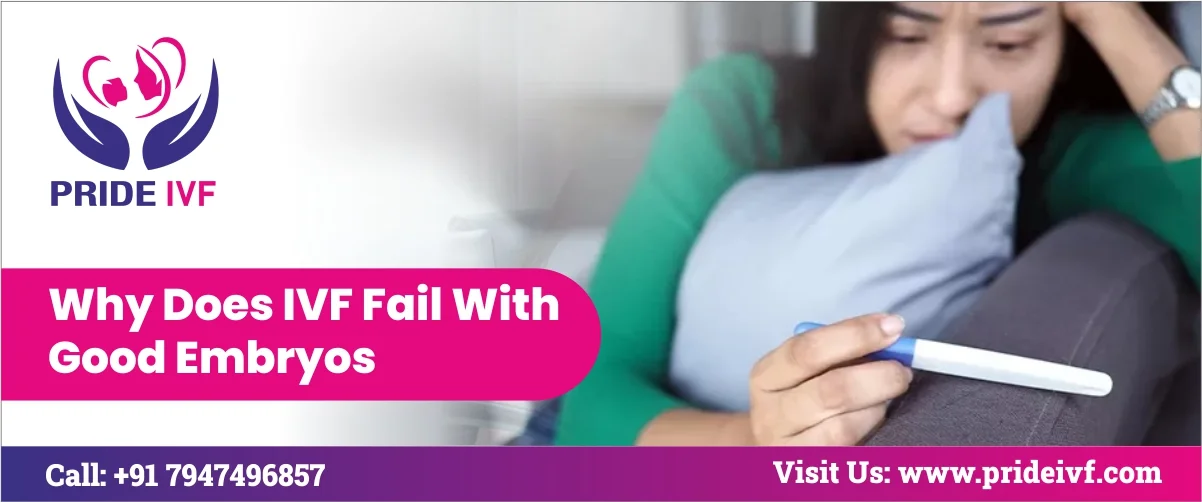In Vitro Fertilization (IVF) is an Artificial Reproductive Technology procedure involving transferring fertilization of egg and sperm in a lab, and transferring healthy embryos to the uterus. However, irrespective of using healthy embryos, several couples and individuals face disappointment due to failed IVF procedures This can be highly distressing for individuals and couples, who see IVF as their resort to living their dream of parenthood. But why does IVF fail with good embryos? In this blog, we will delve into reasons why the IVF procedure might fail even with good embryos, and how to deal with IVF failure.




Why Does IVF Fail With Good Embryos?
Sometimes, the IVF procedure gives unsuccessful outcomes, irrespective of using good embryos. Here are several reasons why your IVF may fail even after good quality embryos:
-
Genetic Disorders in the Embryo:
Embryos selected for transfer are of the best quality. However, they may still contain genetic disorders that might impact their survival rate and impact IVF outcomes. These may include genetic defects inherited from the parents or acquired during fertilization. These anomalies highlight the need for thorough genetic screening procedures in IVF cycles as they can impede embryo development and raise the risk of implantation failure or early pregnancy loss.
-
Issues with Embryo Implantation:
Problems during the implantation process can cause the IVF procedure to fail, even with the best-quality embryos. The embryo’s potential implantation failure may result from immunological responses, an inappropriate uterine environment, or insufficient endometrial lining thickness. These challenges shed light on the importance of treating immune system dysfunction and uterine health to maximise the likelihood of implantation and allow pregnancy.
-
Rejection by Immune System:
In some cases, the embryo may be, for some reason, recognized by the mother’s immune system as a foreign object. This can trigger an immune response, causing rejection of the embryo. This is another reason for IVF failure (failed ivf cycle, what next) with good embryos. Immune-mediated embryo rejection can hinder implantation and compromise the effectiveness of the procedure. Improved treatment outcomes and a reduced risk of immune-related infertility can be achieved by understanding the complexities of the immune system and the use of targeted interventions.
-
Hormonal Imbalances:
In IVF cycles, successful implantation and subsequent pregnancy depend on the balance of hormones in the body. Hormonal imbalances in the developing embryo and the mother’s body can impact implantation as well as the chances of a successful pregnancy. IVF failure may be caused by various factors like poor endometrial receptivity, abnormal embryo development, or insufficient hormonal support. To improve IVF success rates, hormonal imbalances must be addressed with specialized treatment protocols and supportive therapies. Also Read: what happens to your body after failed ivf?
-
Stress & Lifestyle Factors:
Stress and several lifestyle habits can also impact IVF outcomes irrespective of using good quality embryos. Excessive stress and unhealthy lifestyle practices can affect reproductive health and lead to a decline in the chances of successful IVF outcomes. Therefore, it’s recommended that you should maintain healthy lifestyle habits, and practice remedies to manage stress-levels when you’re on your IVF journey.
Also Read: Stages Of Grief After Failed IVF, Why IVF Fails?
Lets get started
Which Other Factors Can Impact the Success of IVF?
Despite the use of good-quality embryos, many factors can affect the success of IVF. These may include:
- Age and Overall Health: As the Maternal age increases. , the quality and quantity of the eggs decreases. In addition, medical conditions such as polycystic ovary syndrome (PCOS), endometriosis, and hormonal imbalance can affect the results of IVF.
- Uterine Health: Uterine health plays an important role in embryo implantation. Problems such as uterine disease, thickening of the endometrium, or the presence of fibroids can interfere with the implantation process.
- Quality of Sperm: The quality of the sperm used in IVF can affect fertilization success and embryo development. Factors such as low sperm count, low motility, or abnormality can affect the chances of a successful pregnancy.
- Laboratory Procedures During Embryo Development: Procedures in which embryos are grown in the laboratory can have a significant impact on embryo development. The temperature, pH level and composition of the culture medium must be carefully maintained for optimal embryo development.
- The Skills and Experience of the IVF Team: The expertise and experience of the doctors and embryologists involved in the IVF also impact the success of IVF procedure. Improper handling and manipulation of embryos during procedures such as embryo transfer can affect implantation. Also Read: questions to ask ivf doctor after a failed cycle.
Conclusion
IVF procedures often fail, irrespective of things going in the right direction. Before going for an IVF procedure, it is important to understand that the success rate of this procedure varies from person to person, and be prepared for its outcomes. What’s important is to not lose hope, and look for alternatives if the procedure fails for some reason.




